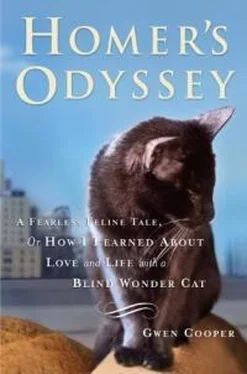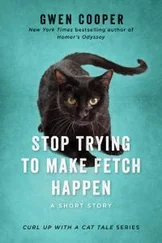So every afternoon when I’d finished work for the day, I would stop by Patty’s office. She would take the kitten from his kennel and set us up in one of the exam rooms, allowing him to roam freely while I sat mostly silent in a corner of the room and watched him.
I could tell already that he was a tireless explorer. The weight of that plastic cone around his neck, which went before him like the shield of a knight-errant crossing enemy terrain, made it difficult for him to hold his head fully erect. But he almost always kept his nose to the ground anyway. The exam room was minuscule, but not an inch of it went unsniffed. When he encountered a wall or table, his tiny paws would cautiously make their way up its side, an engineer testing dimensions and thickness. The only thing he attempted to climb was the chair that stood in one corner of the room, although a large potted plant that stood in the opposite corner was also fascinating. This was my first instance of using the word no with him; I didn’t want him to end up with a coatful of dirt, or to inadvertently tear the plant to shreds.
Finally it was the day before the kitten was supposed to come home, and still he was nameless. It seemed as if Socket was in danger of becoming his name by default.
He needed a name, and it needed to be the right one. So I tried to think of him as if he were a character in a story. His life had already begun as so many of the best stories do—with trials and suffering, miraculous reversals and innumerable obstacles still to be overcome.
But it occurred to me that he wasn’t just the subject of a story; he was also a creator of stories. Lacking even a concept of vision, I was sure he made things up to account for the world around him. How else to understand a chair that mysteriously appeared to block his path in a spot where only yesterday there had been no chair? What was a chair? Why and how did chairs come to be? And how to explain the omniscience of an adoptive mother who could instantly tell—no matter how silently he crept—the precise moment he was contemplating something forbidden? The fourth time he attempted to climb into the large, dirt-filled pot of the plant in the corner, I issued my fourth firm and unexpected “No!” The kitten’s face crinkled into perplexity. He was, of course, unable to distinguish between “soundless” and “invisible.” I was walking so quietly! How can she always know?
You think, when you adopt a pet, that he will become a supporting character in the story of your life. But I was beginning to think I was now a character in this kitten’s story. From a struggling single girl, racked with self-doubt and saddled with three cats, I had become an all-knowing and implacable deity, a being of great benevolence and mystery.
I watched him tentatively traverse that exam room—a landscape so small and, by now, familiar to me, so vast and unknowable to him. He navigated between the Scylla and Charybdis of a table leg and a small bowl of water that had been left out for him. Once he tumbled, face-first, into that water bowl. I snatched him up protectively, murmuring Good kitty, good boy , and he purred, content that the heavens favored him once again. No matter how many times he encountered the wrath of the water bowl, or leapt and misjudged the height of the chair, or ran into a table leg he’d forgotten was there, he persevered.
There’s a place on the other side of this , he seemed to tell himself, and things I must do there .
He was a hero on a quest. But he was more than that; he was also the one who created heroes and myths about the gods—for the same reason myths have always been created: to explain the inexplicable. He was Odysseus and he was also the blind storyteller who’d imagined Odysseus, who’d seen life on an epic scale even when he couldn’t see anything at all.
And then I knew what my kitten’s name was.
“Homer,” I said aloud.
He responded with a lusty mew .
“Good, then.” I was pleased we agreed. “Homer it is.”

2 • What Do You See in an Eyeless Cat?
You ought not to practice childish ways, since you are no longer that age.
—HOMER, The Odyssey
DURING THAT WEEK WHEN HOMER AND I WERE FIRST GETTING TO KNOW each other within the sanctuary of Patty’s office, Melissa was busily spreading the news of Homer’s imminent arrival among our circle of friends. The offhand question, “Did you hear we’re adopting an eyeless kitten?” was the kind of thing that was sure to dramatically shift the flow of general conversation, inviting a flurry of additional questions in its wake. “Eyeless? Eyeless? You mean, like, he has no eyes at all?” So it was that, even before he came to live with me, the story of Homer was repeated so often and so identically that it came to feel like an official part of the family legends and formative anecdotes that made up the ongoing narrative of my life—the way, for example, my parents have spent more than thirty-five years relating in the exact same way the tale of how my mother went into labor with me at a rock concert, two weeks ahead of schedule, because “Gwen couldn’t wait to hear all that music.” (Had I gone on to become a rock star instead of a writer, by the way, that story would carry far more dramatic resonance today.)
It’s true that I still slip into precisely the same language and cadence when telling the story about Homer’s adoption as I did back then. But that’s only because the questions I’m asked haven’t changed at all. I’ve gotten questions about Homer from hundreds of people over the years, and they’re always— always —some variation on the same three: How did he lose his eyes? How does he get around? Can he find his litter box/food/water?
And yet I never get tired of answering. Not because I’m so fond of talking about my cats in general, but because even though I’ve long since gotten used to Homer’s blindness, I’ve never taken for granted, or stopped being inordinately proud of, how brave, smart, and happy my little boy has turned out to be.
I was having dinner with a new work-related acquaintance recently, and the subject of Homer came up. She had been telling me about her kitten, adopted less than a month earlier, and I regaled her with anecdotes of Homer’s kittenhood adventures and misadventures. I had never discussed Homer with her before, but she found him as interesting as most people do when they hear about him for the first time. Then, out of nowhere, she hit me with a question that stopped me cold:
“Why did you adopt him?”
It was a question that might have sounded aggressive or hostile coming from somebody else, as if to say, What could you possibly see in an eyeless cat? Yet the woman’s face was kind as she asked it, her tone gentle and sympathetic. It was a question posed in a straightforward way, with an apparently straightforward interest in hearing my answer.
And I wanted to give her an answer—one as simple and straightforward as the query had been. But it was a question that I quite literally had never been asked before; for the first time in more than twelve years I had no simple, automatic response at my disposal.
Because I’d never been asked this question, it had never occurred to me to wonder why nobody else ever asked it. Thinking about it now for the first time, it made perfect sense that nobody would ask why I had adopted Homer, because the answer, on the face of it, seems obvious. Either I’d been so affected by his hard-luck story that I would have been miserable and guilt-ridden if I hadn’t rescued him from almost certain death in a shelter—or we’d so immediately bonded, falling instantly in love with each other from the moment I first picked him up, that I couldn’t have borne to leave him there. I realized that everybody, even the people who knew me best, my family or the friends I’d had for decades, probably thought that those were the reasons I’d adopted Homer.
Читать дальше













